Ryusei-Kacho (2002)
Gênero : Fantasia, Comédia
Runtime : 13M
Director : Hideaki Anno
Sinopse
Ryusei-Kacho is renowned for his unmatchable skills in securing a seat on the infamous Japanese commuter trains. Never once has he failed until he meets the beautiful and talented Automatic Maria.

A black and bloody Irish comedy about a sad train journey where an older man, whose wife has died that morning, encounters a strange and possibly psychotic young oddball...

Wade, a young bootlegger discovers his partner's dead body in the woods and finds himself hunted by an urban criminal. Pushed to the limit Wade turns the tables and gets his revenge.

A first-time feature-film director (who's also the writer and producer) is casting the lead actress. We meet him talking to his wife about the picture and the process. We meet the actress, Sandy, negotiating with her roommate and talking by phone to her mother. Then, we watch Sandy audition for the director at the call-back session; also attending are the casting director and the production company's sycophants. The wrinkle is that the director is a homicidal misogynist, his wife is tied up and hanging from the ceiling, and Sandy has something in her purse that bodes a rocky future. (IMDb)

Oswald's sweetheart is stolen by a schoolyard bully, so he has to fight him during recess to win her back.

Explores a fleeting moment between two strangers, revealing their brief connection in a hyper real fantasy.
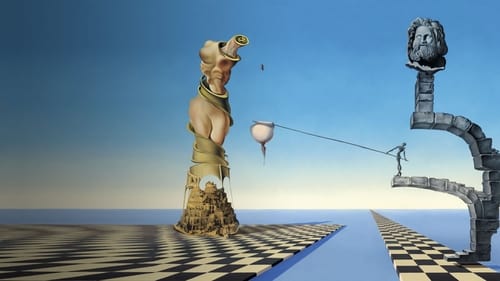
Para uma canção de amor perdido e redescoberto, uma mulher vê e sofre transformações surreais. De relógios derretidos ampulheta de areia, à figuras em tiras, para globos oculares, o estilo e os temas de Dalí são claramente reconhecíveis por toda parte.

The work of photographer Diane Arbus as explained by her daughter, friends, critics, and in her own words as recorded in her journals. Illustrated with many of her photographs. Mary Clare Costello, narrator Themes: Arbus' quirky go-it-alone approach. Her attraction to the bizarre, people on the fringes of society: sexual deviants, odd types, the extremes, styles in questionable taste, poses and situations that inspire irony or wonder. Where most people would look away she photographed.
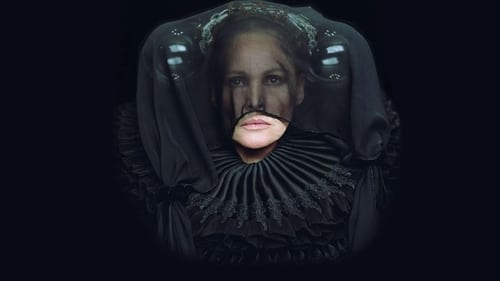
Cremaster 5 (55 min, 1997) is a five-act opera (sung in Hungarian) set in late-ninteenth century Budapest. The last film in the series, Cremaster 5 represents the moment when the testicles are finally released and sexual differentiation is fully attained. The lamenting tone of the opera suggests that Barney invisions this as a moment of tragedy and loss. The primary character is the Queen of Chain (played by Ursula Andress). Barney, himself, plays three characters who appear in the mind of the Queen: her Diva, Magician, and Giant. The Magician is a stand-in for Harry Houdini, who was born in Budapest in 1874 and appears as a recurring character in the Cremaster cycle.
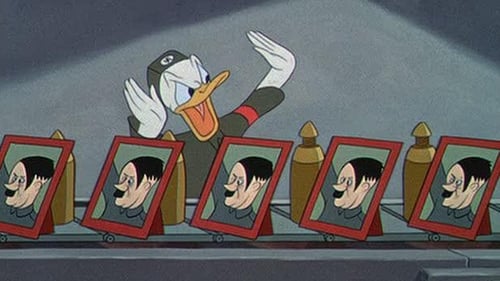
A marching band of Germans, Italians, and Japanese march through the streets of swastika-motif Nutziland, serenading "Der Fuehrer's Face." Donald Duck, not living in the region by choice, struggles to make do with disgusting Nazi food rations and then with his day of toil at a Nazi artillery factory. After a nervous breakdown, Donald awakens to find that his experience was in fact a nightmare.
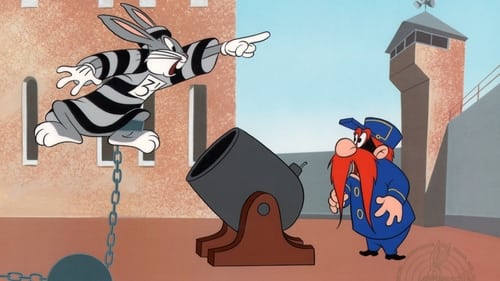
Bugs Bunny escapes hunters by leaping into his rabbit hole and tunneling to safety. Unhappily he tunnels into the Sing Song prison where a sadistic prison guard named Sam Schultz refuses to accept that he's anything but one of the prisoners. Soon Bugs is in stripes, but it's the guard who will find prison life to be hell when Bugs Bunny is around to trick him into a cell, the hangman's noose, an electric chair and even into the warden's office, where Bugs will put a severe strain on the relationship between boss and underling. Finally, Sam decides that enough is enough.

Skazka Skazok (Tale of Tales) is a 27-minute animated short film, considered the masterpiece of influential Russian animator Yuri Norstein. Told in a non-narrative style by free association, the film employs various techniques including puppets, cut-outs, and traditional cell animation. Using classical music and '30s jazz tunes instead of dialogue.
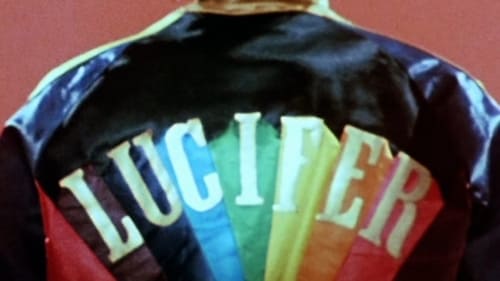
“Tu és Lúcifer!” Contrariamente ao que transmite a cultura popular de tradição cristã, a etimologia e a história das religiões esclarece que Lúcifer é o “portador da luz”, uma divindade luminosa na antiguidade clássica, a estrela da manhã para os que se orientavam pelos astros ou, numa interpretação gnóstica, aquele que revelou o verdadeiro conhecimento aos homens, denunciando as ilusões do Demiurgo, o falso deus. No cruzamento inter-mitológico esotérico de tradição crowleiana, Lúcifer, o príncipe da aurora dourada, é por vezes associado ao deus egípcio Hórus, uma divindade solar que teria revelado ao próprio Aleister Crowley um novo tempo, uma nova era, o Aión do Aquário, uma época de paz e conhecimento de que ele haveria de ser o profeta.
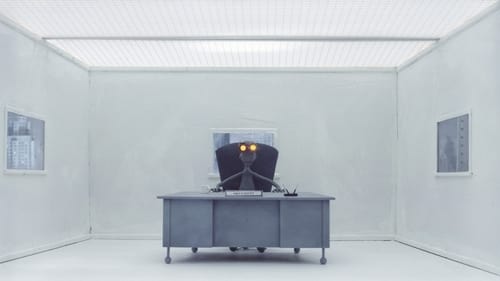
A factory worker in a dark, gray world assembles devices that promise happiness. In his spare time he tinkers to create something better, and finally succeeds in perfecting his invention, which allows people to see life through rose-colored glasses, but he has to pay a price for his success.
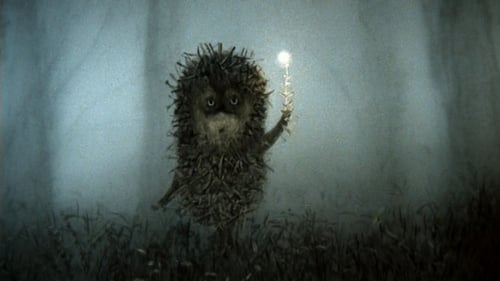
A little hedgehog, on the way to visit his friend the bear, gets lost in thick fog, where horses, dogs and even falling leaves take on a terrifying new aspect...

Big brother Rabbit takes care of his little sister all day while their parents are sleeping after a carrot hunt the night before. And he has a lot of patience with his stubborn and waddling little sister.

Sylvester Cat spots Tweety Bird in a display window of an after-hours department store and sneaks inside through a mail server chute. Tweety flees Sylvester by hiding in a hat pile and a doll house, evades the shots from a rifle Sylvester uses, and escapes in a vacuum tube. Tweety sends a dynamite stick through another tube, and Sylvester swallows it, thinking it is Tweety. The dynamite blows up inside Sylvester after the cat leaves the store and walks down the street.

A Corny Concerto is an American animated cartoon short produced by Leon Schlesinger Productions and distributed by Warner Bros. It was directed by Bob Clampett, written by Frank Tashlin, animated by Robert McKimson and released as part of the Merrie Melodies series on September 25, 1943. A parody of Disney's 1940 feature Fantasia, the film uses two of Johann Strauss' best known waltzes, Tales from the Vienna Woods and The Blue Danube, adapted by the cartoon unit's music director, Carl Stalling and orchestrated by its arranger and later, Stalling's successor, Milt Franklyn. Long considered a classic for its sly humor and impeccable timing with the music, it was voted #47 of the 50 Greatest Cartoons of all time by members of the animation field in 1994

Edo, Japan. Calligraphists are not mere writers, they can bring drawings to life and utilize kanji. Three calligraphists from the art wielding clan join up and fight against an exiled calligraphist and his minions to protect the Tokugawa shogunate.
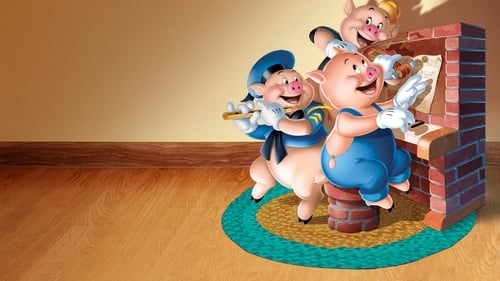
Os dois porquinhos construindo casas de feno e varas zombam de seu irmão, construindo a casa de tijolos. Mas quando o lobo chega e derruba suas casas (depois de truques como se vestir como uma ovelha enjeitada), eles correm para a casa de seu irmão. E por toda parte, eles cantam a música clássica, "Quem tem medo do lobo mau?".

The story revolves around 3 soldiers who are on the outskirts of a war torn city. They are patrolling an area when a bomb is accidentally set off and they have to wait for help.


















